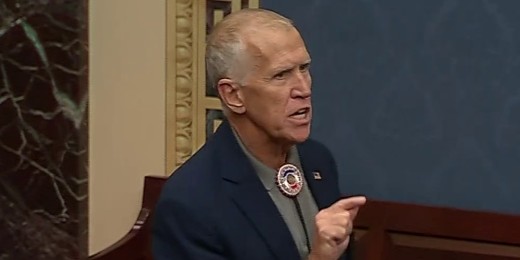The Dictatorship
The Trump admin’s book purge at the Naval Academy goes beyond petty authoritarianism

The Trump administration’s rush to enact authoritarian policies has touched all parts of American lifebut we didn’t expect it to affect our family the way it did.
We are a mother-daughter writing team. In mid-April, one of us, Cathy Johnson, found out that the U.S. Naval Academy had removed her book in a Trump administration-led purge of its library. To her, and to the rest of our family, this decision came as a surprise. Cathy and her co-authors published the book, “Creating Gender: The Sexual Politics of Welfare Policy,” in 2007. It’s an academic book that received positive reviews from leading political science journals.
But without offering an explanation to Cathy or her publisher, the academy removed it from circulation. A spokesperson for the Navy told us that the removals were “in order to comply with directives outlined in Executive Orders issued by the President.”
Without offering an explanation to Cathy or her publisher, the academy removed it from circulation.
Neither of us are strangers to pushback from the right. One of Cathy’s courses at Williams College on feminism and political activism was targeted by campus conservative groups in the early 2000s. Hannah, her daughter, has been reporting on and researching the radical right, including its ties to the first and second Trump administrations, for nearly a decade. While we’re not shocked by these brazen attempts to quash intellectual inquiry from an administration whose prior term ended with an armed insurrection in the U.S. Capitol, we find these developments particularly disturbing.
Co-authored with professors Georgia Duerst-Lahti and Noelle Norton, “Creating Gender” argues that ideas about gender are a flashpoint in American politics, one that intersects with the familiar left-right spectrum. By drawing on gender theory, social welfare policy and the study of legislative behavior, the book examines the ways in which political actors use policy to shape “the way men and women should live their lives.” Policy praises and condemns; it rewards and punishes.
“Creating Gender” investigates how ideas about gender influenced the design and implementation of social welfare policy as Temporary Assistance to Needy Families (TANF) — a program that helps states fund services for low-income families with children — was adopted and then implemented by the states.
The administration and its allies have railed against “gender ideology extremism,” which it has used to enact anti-trans and anti-LGBTQ+ legislation. To the extent that “gender ideology” refers to the notion that ideas about gender can, and do, inform policymaking, it’s clearly a bedrock principle of the administration. President Donald Trump has referred to himself as “the fertilization president” and floated pro-natalist policies that would direct cash bonuses to mothers after the births of each child.
The administration has made clear that not all families are equal. Project 2025 — the Heritage Foundation’s 900-plus-page guidebook for the administration’s speedrun into authoritarianism — encouraged all levels of government to manipulate their services to prioritize married heterosexual, cisgendered couples.
“Married men and women are the ideal, natural family structure because all children have a right to be raised by the men and women who conceived them,” Project 2025 declared. Elsewhere, it implores the Department of Health and Human Services to “prioritize married father engagement in its messaging, health, and welfare policies.” It attacks TANF on the grounds that it has supposedly failed to prioritize “[m]arriage, healthy family formation, and delaying sex to prevent pregnancy.”
Today, “Creating Gender” and the 380 other books the Naval Academy removed from Nimitz Library are now inaccessible to patrons. The full list represents a bizarre collection of books that appear to be identified based on keywords.
Reporting in The New York Times and elsewhere has described the book purge as tied to a Jan. 29 executive order that seeks to end “radical indoctrination” in kindergarten through 12th grade classrooms. The Naval Academy, a college, thought it was exempt from the order, but the Times reported that Defense Secretary Pete Hegseth’s office told the Naval Academy that the secretary “expected compliance” from the military academies, too.
These authoritarian outbursts have much deeper roots.
That same executive order also called for the revival of Trump’s 1776 Commission, a committee that he formed during his first term to support “patriotic education.” (Curiously, the list of removed titles even includes a book from one of the commission’s former membersCarol Swain, author of the 2004 book “The New White Nationalism in America: Its Challenge to Integration.”)
“We’ve said goodbye to the harmful effects of woke culture and so-called diversity, equity and inclusion programs. We’re removing DEI content,” Secretary Hegseth said during a visit to the Army War College in April.
It isn’t clear why the Naval Academy was the first to conduct these removals, but other institutions of higher education within the Defense Department appear prepared to implement similar processes.
The head of the Naval War College recently announced to community members in an email that there were plans to form a committee consisting of faculty and Defense Department officials to assess how to conduct similar removals, according to two sources who received the email and who spoke to us on the condition of anonymity, over concerns of professional retaliation. The sources said that it was unclear who specifically would be on the committee, and officials have not announced when this process would begin. A spokesperson for the Naval War College did not respond to our request for comment regarding whether such removals were going to be implemented at the school.
“I think the bans are appalling,” Lynne Rienner, whose eponymous publishing house released “Creating Gender” in 2007, told us. The book was one of four titles that Lynne Rienner Publishers released from academics that the academy purged.
“It will not have a chilling effect on what we’re willing to publish. I’m concerned that it will have a chilling effect on academic research to the extent that people are dependent on federal funding for their research. And we’re already seeing that,” Rienner added.
We reached out to the Defense Department and the Naval Academy for comment regarding the purges and “Creating Gender’s” removal, specifically. A spokesperson from Hegseth’s office referred us to the Navy. When we followed up with a quote from Hegseth’s recent appearance at the Army War College, as well as a link to a Times article, which previously reported that the decision to remove the books arose from an order from the defense secretary’s office, the spokesperson said, “We don’t have anything additional to provide at this time.” The spokesperson again referred us to Navy officials.
Naval Academy media relations did not respond to a list of several questions related to the purges.
These book removals might seem in line with the Trump movement’s obsession with “trolling” liberals or punishing institutions of higher education for being insufficiently deferential to conservatives. He and his supporters have spoken openly about their attacks on colleges, universities, museums and cultural landmarks as being rooted in the misguided belief that they are victims.
But to us, these authoritarian outbursts have much deeper roots. For all the fawning pieces outlining the right’s “intellectual vitalism” in the second Trump era, the movement’s full-throttled embrace of censorship and hostility to its perceived enemies is indicative of a deep lack of curiosity about the world.
While graduates like Adm. James Stockdale might have read Karl Marx at the Naval Academy in the 1960s to understand an ideology the U.S. government saw as enemy No. 1, they at least read his books. Today’s petty authoritarians see no such need.
Hannah Gais
Hannah Gais is a journalist and researcher focused on the radical right. She is a frequent contributor to The Baffler.
Cathy Johnson
Cathy Johnson is a James Phinney Baxter III Professor of Political Science, Emerita, at Williams College.
The Dictatorship
Trump’s plans for Americans’ data become clearer – and leave tech experts alarmed

Happy Tuesday. Here’s your Tuesday Tech Dropthe past week’s top stories from the intersection of technology and politics.
Trump’s data dreams
In recent months, there’s been widespread speculation over the Trump administration’s reported plans to work with controversial tech company Palantir to compile a massive database of Americans’ personal information. Now we have a bit of clarity on how some of that data could be used.
NPR reported Monday that the administration has developed a national citizenship data system that it wants states to use to crack down on noncitizen voters — a fascination of Donald Trump’s, despite the lack of evidence that such voters have affected the result of any U.S. election. One wonders whether and how this tool might be used to fuel Trump’s conspiracy theories.
Experts have raised concerns about the accuracy of the data being used, as well as whether this administration — which is currently trying to ramp up efforts to strip some Americans of their citizenship — can be trusted to deploy this tool ethically.
Read more at NPR.
Canada axes digital tax
Trump did the bidding of large tech companies when he said Friday that he was ending trade negotiations with Canada in response to the country’s digital services tax on tech companies — foreign and domestic — that was set to go into effect on the last day of June. Canada then rescinded the tax.
Read more at CNBC.
AI moratorium’s mortality
After a tentative deal appeared to have been reached between Sens. Ted Cruz, R-Texas, and Marsha Blackburn, R-Tenn., it appears a 10-year ban on states instituting regulations around artificial intelligence has been dropped from Republicans’ budget bill. For now.
Read more at Time.
Musk’s ‘fixer’ reportedly no longer at Tesla
One of the top executives at Tesla — Omead Afshar, who has been called Elon Musk’s “fixer” by The Wall Street Journal — has reportedly left the company. Tesla has been mired in a sales slump and ongoing tumult, partially stemming from backlash over Musk’s role in crafting Trump’s policies.
Read more at Forbes.
Bezos’ outreach to Trump
The Wall Street Journal reported that Amazon CEO Jeff Bezos has been cozying up to Trump, in an effort that the newspaper frames as an attempt to secure funding for Bezos’ aerospace company, Blue Origin, and capitalize on Trump’s rift with Musk.
Read more at The Wall Street Journal.
FTC puts its finger on the scale
Republicans have sought to crack the whip on companies that choose not to advertise on right-wing media platforms — in some cases, because said platforms have been known to promote hate speech. The Trump administration has made clear that it has no issue with holding up corporate mergers in order to extract political concessions, and that seems to have been the case last week when Trump’s handpicked FTC chairman announced that he was approving a merger of large advertising firms on the condition that the newly formed organization doesn’t take part in any ad boycotts based on political or ideological viewpoints.
Read more at Ars Technica.
Anti-ICE app
As Americans look for ways to navigate a country in which Immigration and Customs Enforcement agents — many of them masked — are seizing people off the streets and placing them in detention facilities, one developer has launched an app, ICEBlock, that tips people off as to where ICE agents have been sighted. The Trump administration, which has sought to crack down on reporting on ICE raids, clearly isn’t happy about this creation and responded — in dictatorial fashion — by threatening the app’s developer with DOJ scrutiny and even threatening CNN with prosecution for reporting on the app.
Read more at CNN.
The Dictatorship
The conservative wing of the Supreme Court just gave Democrats a potent weapon

In a string of cases Friday, the conservative justices on the Supreme Court handed the Republican Party win after win. The court restricted nationwide injunctions against President Donald Trump’s order on birthright citizenship, greatly hindering the powers of lower federal courts to constrain the president. It allowed parents to opt their kids out of public school education that offended their religious upbringing. And it let the state of Texas require age verification before anyone looks at online porn.
There is no question that each of these cases is a significant victory for conservatives in the short term. However, each also gives liberals an opening to try to accomplish their policy goals, but only if they are willing to be aggressive and break norms they’ve previously wanted to maintain.
Justice Sotomayor’s tit-for-tat warning was directed at the justices in the majority, but it could also be seen as an invitation to Democrats.
First, in the birthright citizenship case, the Supreme Court’s six Republican-appointed justices addressed a procedural question, not the issue of whether the president’s order rejecting the idea of birthright citizenship is unconstitutional (even though it clearly is under the Fourteenth Amendment and federal statutory law). On the procedural issue, the court held that lower federal court orders stopping the president’s unlawful actions could apply only to the people who brought those cases. In other words, even if a president issues a plainly unconstitutional order, all lower courts can do is provide relief to the individuals who had the foresight and resources to sue in federal court. The order cannot apply to everyone else in the country.
Yes, there are some exceptions. Cases can be brought as class actions, meaning a small number of people can bring the case on behalf of all other people in the country like them, but the court has spent the past two decades making such cases harder to bring. Also, states might be able to sue on behalf of their citizens and get nationwide relief under the theory that a citizen of, say, New Jersey, travels to other states and needs protection there. However, several justices have been skeptical of cases brought on behalf of others, so the future viability of such a strategy is unknown. Finally, never shy about giving itself more power, the Supreme Court said it can issue nationwide injunctions.
However, the court’s holding against universal injunctions from lower court judges is now the law of the land. And as a legal rule, in theory, this decision should apply in all cases regarding universal injunctions, not just cases brought against Republican policies. Justice Sonia Sotomayor recognized this in her dissenting opinion: “Today, the threat is to birthright citizenship. Tomorrow, a different administration may try to seize firearms from law-abiding citizens or prevent people of certain faiths from gathering to worship.”
Justice Sotomayor’s tit-for-tat warning was directed at the justices in the majority, but it could also be seen as an invitation to Democrats willing to push boundaries. The next Democrat in the Oval Office or even Democrats now in charge of state governments can look at the Supreme Court decision and take new actions knowing that lower courts shouldn’t have the power to issue nationwide or statewide injunctions stopping them.
A health care directive promoting reproductive freedom? An executive order forgiving student loans? A state initiative that restricts gun sales? A vaccination requirement that some religious people object to? An environmental directive that might infringe on some business’ claimed right? After Friday’s decision, even if these policies are challenged before very conservative federal judgesthose judges shouldn’t have the power to stop these Democratic actions beyond just the parties to the case, no matter how unlawful or unconstitutional these judges believe them to be.
Some or all of these actions might not survive the court’s eventual scrutiny.
Liberals can apply the same thinking to the Supreme Court’s ruling about LGBTQ+ books and religious exemptions. In that case, the conservative majority said that schools that teach books that burden parents’ religious beliefs violate the Constitution’s guarantee of free exercise of religion. In order to avoid this, schools must offer kids an opt-out so they aren’t forced to learn about gay marriage or trans people. Critics of the court’s decision worry that parents might cite their faith to push back against books that include depictions of interracial marriage, women in the workplace or evolution.
But liberals can have beliefs grounded in religion, too. Which means they, too, can throw a monkey wrench into the system on behalf of their liberal agenda. For instance, schools around the country are adopting “Baby Olivia” videos to promote anti-abortion views. A religious family who believes bodily autonomy and women’s rights are central to their religion can object and force the school to create an opt-out process.
Finally, there’s the age verification case involving online porn. In this case, the conservative justices said that while adults have the right to view pornography, minors don’t. Thus, Texas is allowed to put what the majority of the court viewed as a minimal burden on adults — the online age verification process — in order to stop minors from viewing porn, even though some adults viewed the process as violating their privacy.
Once again, liberals can play this game, as well. For instance, if Texas wants age verification for porn websites, California could require age verification for websites that sell or advertise guns.
Sure, some or all of these actions might not survive the court’s eventual scrutiny. Each of the doctrines at issue in these cases and hypotheticals have exceptions and complicated sub-rules. Moreover, if the Supreme Court doesn’t care about law and cares only about furthering a conservative ideological agenda, it will find a way to rule against liberal causes and politicians while ruling for conservatives.
But Democrats and liberals need to force the court’s hand by using these supposedly neutral rules to push their own agenda. The court may be tilted ideologically against them, but that doesn’t mean giving up ahead of time. Instead, they should use the tools given to them to accomplish their policy goals and dare the Supreme Court to display blatant hypocrisy by stopping them.
The Dictatorship
Jury reaches partial verdict in Sean Combs trial, unable to reach verdict on Count One


-

‘It’s all a big stunt’: Inside Trump’s cruel plans for ‘Alligator Alcatraz’
06:45
-

‘First time in our history we are rolling back care’: Top Democratic senator slams Trump’s megabill
09:19
-
Now Playing

-
UP NEXT

‘A political poison pill’: Republican Senators plow ahead with Trump’s deeply unpopular bill
11:15
-

‘An aggressive pen pal’: Trump says U.S. will send countries letters to set tariff rate
04:49
-

‘A moral obscenity’: Top Democrat sounds off on GOP hypocrisy over Trump’s megabill
11:06
-

INSIDE: How a community organization is fighting back as Los Angeles ICE raids ramp up
06:05
-

GOP Senator is ‘the best ad Democrats have going into midterms,’ rips Trump’s budget bill
11:32
-

‘We just don’t know’: Trump can’t accept successful strike, insists on ‘obliteration’
09:54
-

‘I will never forget what I saw’: Shocking new reporting from inside immigration detention centers
09:24
-

NEW: Top Democratic senator makes the case for how the party fights Trump on the economy
11:38
-

Nicolle Wallace breaks down Pete Hegseth’s meltdown and tantrum at Pentagon press conference
09:33
-

Why Nicolle Wallace says ‘this week is officially the F-U week of Trump’s second presidency’
09:55
-

‘They got caught in a lie’: Sen. Murphy on Trump and Hegseth’s meltdown over intel report on Iran
09:11
-

‘He didn’t sound like a politician’: Why Mamdani is poised to defeat Cuomo in NYC primary
05:09
-

Nicolle Wallace slams GOP on Medicaid cuts: ‘Mitch McConnell doesn’t give a you-know-what’
11:56
-

‘Never seen him like this’: Marine vet speaks out after shocking video of his father being beaten by ICE
11:15
-

‘You cannot bomb your way out of this’: Rep. Jason Crow on Trump Administration’s intel missteps
12:00
-

Trump’s claims that Iran nuclear program was ‘obliterated’ called into question
11:48
-

‘A bum’: Trump looks to oust GOP Congressman for publicly opposing Iranian nuclear strikes
06:57
-

‘It’s all a big stunt’: Inside Trump’s cruel plans for ‘Alligator Alcatraz’
06:45
-

‘First time in our history we are rolling back care’: Top Democratic senator slams Trump’s megabill
09:19
-
Now Playing

Jury reaches partial verdict in Sean Combs trial, unable to reach verdict on Count One
06:54
-
UP NEXT

‘A political poison pill’: Republican Senators plow ahead with Trump’s deeply unpopular bill
11:15
-

‘An aggressive pen pal’: Trump says U.S. will send countries letters to set tariff rate
04:49
-

‘A moral obscenity’: Top Democrat sounds off on GOP hypocrisy over Trump’s megabill
11:06
-

 The Josh Fourrier Show8 months ago
The Josh Fourrier Show8 months agoDOOMSDAY: Trump won, now what?
-
Uncategorized8 months ago
Bob Good to step down as Freedom Caucus chair this week
-

 Politics8 months ago
Politics8 months agoWhat 7 political experts will be watching at Tuesday’s debate
-

 Politics8 months ago
Politics8 months agoHow Republicans could foil Harris’ Supreme Court plans if she’s elected
-
Economy8 months ago
Fed moves to protect weakening job market with bold rate cut
-
Economy8 months ago
It’s still the economy: What TV ads tell us about each campaign’s closing message
-

 Politics8 months ago
Politics8 months agoRFK Jr.’s bid to take himself off swing state ballots may scramble mail-in voting
-
Uncategorized8 months ago
Johnson plans to bring House GOP short-term spending measure to House floor Wednesday






